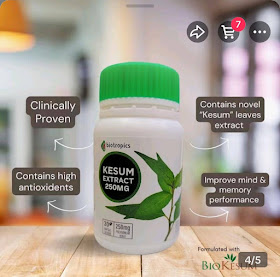‘KESUM’ must-read, something that no existing drug or supplement has fully achieved.
Neurodegeneration and the Potential of Kesum for Brain
Recovery
The human brain contains approximately 86 billion neurons
(nerve cells). However, due to aging and various neurological conditions,
neurons gradually die and are not easily replaced. Research suggests that
around 85,000 neurons die daily due to aging, oxidative stress, and diseases
such as Alzheimer's and dementia.
Impact of Neuron Loss Over Time
If we calculate the total neuron loss over different periods,
we see a significant reduction:
1 year (365 days) → 85,000 × 365 = 31.025 million neurons lost
3 years (1,095 days) → 85,000 × 1,095 = 93.075 million neurons lost
5 years (1,825 days) → 85,000 × 1,825 = 155.125 million neurons lost
This loss accelerates with age. By the time an individual reaches
40–60 years old, the accumulated loss can contribute significantly to cognitive
decline, memory problems, and neurodegenerative diseases like dementia and
Alzheimer's.
MUST
READ
KESUM
Kesum (Polygonum minus) – A Breakthrough in Brain Health
Recent discoveries indicate that Kesum’s active compounds,
including quercetin, increase Brain-Derived Neurotrophic Factor (BDNF) by 2%.
BDNF is a crucial protein that helps:
i. Stimulate the
growth of new neurons (neurogenesis)
ii. Protect existing neurons from damage and death
iii. Enhance memory, learning, and cognitive function
Unlike conventional brain supplements such as Ginkgo biloba,
green tea, Bacopa monnieri, garlic, and fish oil, which mainly improve blood
flow to the brain, Kesum actively promotes neuroregeneration a process crucial
for slowing down brain degeneration.
Why Kesum is Better than Donepezil and Other Drugs
Donepezil, a commonly prescribed drug for Alzheimer’s, only
works by inhibiting the breakdown of neurotransmitters to temporarily improve
cognitive function. However, it does not stimulate new neuron growth or repair
brain damage.
Kesum’s natural compounds work at a deeper level by promoting
BDNF production, which supports long-term neuroprotection and recovery.
The Future of Brain Health and Kesum’s Role
Pharmaceutical companies are actively searching for
neuroprotective and neuroregenerative treatments. Kesum’s ability to enhance
BDNF levels and potentially slow down neuron loss makes it a promising
candidate in the fight against dementia and Alzheimer’s.
This discovery offers hope for a new, natural approach to
protecting and regenerating brain function—something that no existing drug or
supplement has fully achieved.
KESUM
The Impact of Aging on Brain Function '40s & above'.
From the age of 40 and beyond, the brain naturally begins to
lose neurons at a faster rate, and without proper support (such as neurogenesis
stimulation), this can lead to a decline in cognitive function. As neurons die
and are not replaced efficiently, the brain’s ability to process information,
store memories, and make decisions gradually weakens.
Consequences of Neuron Loss Without Regeneration
If the brain fails to maintain or regenerate neurons,
individuals may experience:
1. 👉 Slower
thinking and reaction time
2. 👉 Weaker memory recall and difficulty in learning new information
3. 👉 Increased risk of confusion and forgetfulness
4. 👉 Higher likelihood of developing neurodegenerative diseases
5. 👉 Emotional instability and mental fatigue
6. 👉 Diseases That Accelerate Brain Function Decline (40s & Above)
Certain diseases further accelerate the loss of brain function and must be managed early to avoid worsening cognitive impairment. These conditions limit neurogenesis, increase neuron death, and disturb brain function:
1. Neurodegenerative Diseases (Directly
Affect Brain Cells and Functions).
·
Alzheimer’s Disease → Progressive memory loss, confusion, inability to recognize familiar
people and places.
·
Dementia (Various
Types) → Loss of reasoning, problem-solving skills, and emotional control.
· Parkinson’s Disease → Affects movement and cognitive abilities due to dopamine loss in the brain.
* Multiple Sclerosis (MS) → Damages the nervous system, affecting memory, focus, and coordination.
MUST
READ
KESUM
2. Metabolic & Cardiovascular
Conditions (Indirectly Reduce Brain Oxygen & Nutrients).
· Diabetes (Type 2 Diabetes) → High blood sugar damages neurons & reduces cognitive function.
·
Hypertension
(High Blood Pressure) → Reduces blood flow to the brain, increasing stroke
risk.
· Hyperlipidemia (High Cholesterol) → Clogs arteries, reducing brain oxygen supply.
·
Obesity →
Increases inflammation, which accelerates brain aging.
Science Team 'Sasikala & Sakinah'.
MUST
READ
KESUM
3. Mental Health Disorders (Impair Brain
Neurotransmitters & Memory Function).
·
Chronic Stress & Anxiety → Increases cortisol levels, which damages brain neurons.
·
Depression →
Reduces brain plasticity and shrinks areas like the hippocampus (responsible
for memory).
·
Schizophrenia
→ Leads to severe cognitive decline and memory loss over time.
MUST
READ
KESUM
KESUM
4. Neurological Disorders &
Lifestyle-Induced Issues (Worsen Brain Degeneration).
·
Stroke →
Destroys brain cells in specific regions, causing speech and motor impairments.
·
Sleep Apnea →
Reduces oxygen supply to the brain, leading to memory and focus issues.
·
Alcohol Abuse
→ Causes neuron loss, leading to memory gaps and cognitive dysfunction.
·
Smoking & Drug Abuse → Damage brain circulation and accelerate cognitive decline.
MUST
READ
KESUM
How to Avoid Prolonging Brain Function Decline
To slow down or prevent these issues, individuals above 40
should focus on:
✅
Stimulating Neurogenesis → Use natural compounds like Kesum (Polygonum minus),
rich in quercetin, to increase BDNF levels and promote brain cell growth.
✅
Maintaining Cardiovascular Health → Control blood pressure, sugar, and
cholesterol to ensure proper brain oxygenation.
✅
Reducing Stress & Inflammation → Manage cortisol levels to protect neurons.
✅
Improving Diet & Lifestyle → Avoid processed foods, excessive sugar, and
smoking.
✅ Engaging in Mental & Physical Activities → Exercise and cognitive training keep the brain active.
MUST
READ





















No comments:
Post a Comment